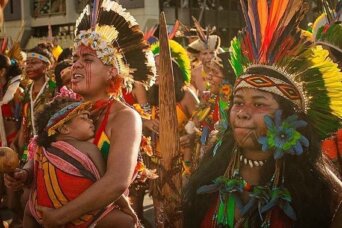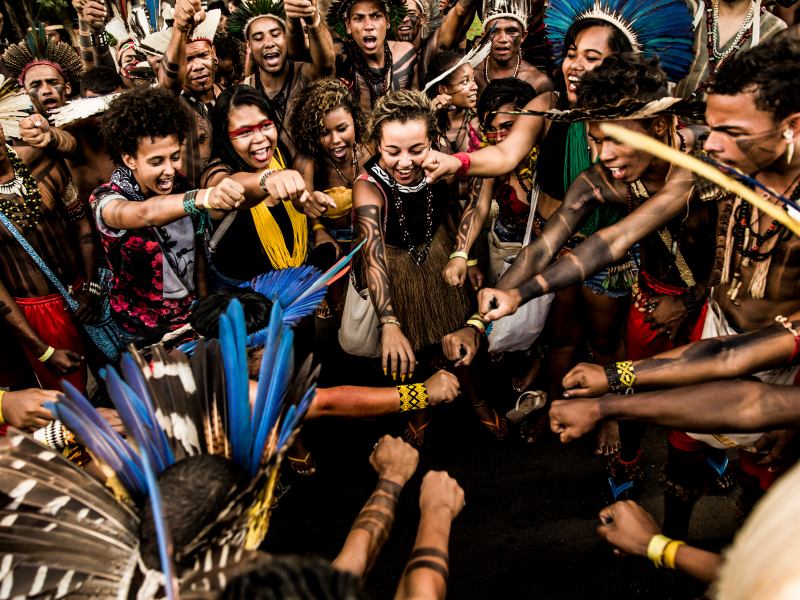- About
- Topics
- Picks
- Audio
- Story
- In-Depth
- Opinion
- News
- Donate
- Signup for our newsletterOur Editors' Best Picks.Send
Read, Debate: Engage.
| topic: | Indigenous people |
|---|---|
| located: | Brazil |
| editor: | Ellen Nemitz |
‘Retaking Brazil from a genocidal government’ was the main theme of the 18th edition of Free Land Camp (Acampamento Terra Livre), one of the largest demonstrations of indigenous populations that took place in Brasilia, Brazil's capital city, between 4 and 14 April and was attended by more than 7,000 people.
The agenda of this year was focused on land protection and demarcation, considering bill 191/2020, which is being voted on by the Congress and could allow the exploitation of indigenous lands for mining, hydroelectric power plants and other ventures, and the Time Limit Trick discussion at the Supreme Court.
The Free Land Camp is not just a protest happening in the streets; it achieved the status of being a voice for all 305 ethnicities in official spaces such as the Supreme Court - where Sônia Guajajara, Eloy Terena and Maurício Terena represented the movement in a meeting with Minister Cármen Lúcia and Minister Dias Toffoli to talk about indigenous agendas. Moreover, the group’s spokesperson visited the Norwegian Embassy and attended the virtual meeting of the European Parliament and the United Nations to denounce human rights violations.
Months ahead of the upcoming presidential election, in which current president Jair Bolsonaro and the former president Luiz Inácio Lula da Silva are projected to be the front-runners, politics played a central role in the demonstration’s program: "We declare this to be the last year of the Genocidal government," reads the presentation of the Free Land Camp on the internet.
Besides, Lula attended one of the plenaries and promised to, if elected, revoke all measures and laws that jeopardise indigenous peoples. On the occasion, more than 30 indigenous pre-candidacies for political roles were launched in a move to occupy legislative spaces. Deputy Joenia Wapichana said, "We want a Brazil that respects the water, respects the forest, respects the mother Earth. Rebuild with people."
Indigenous leaders at the rally claimed that the Bolsonaro administration "Took advantage of the forced isolation of peoples during the pandemic to promote laws that threaten the rights" guaranteed in the Constitution, denying health access during the covid-19 pandemic.
With the notable presence of indigenous youths - who are increasingly visible both in national and international platforms, speaking out about environmental justice and their rights - and the leadership of women, the 2022 edition of Free Land Camp took one more step towards diversity; it also featured a round table dedicated to the LGBTI+ community and its fight for a life free of prejudice.
The fight of Brazil’s indigenous peoples, however, did not end with the scattering of the crowds on 14 April. The beauty of the poetry recited and sung by the rally’s attendees and the colours of their bodies painted with jenipapo and urucum, symbols of a culture forged in the centuries-long battle for their rights, continue to be an inspiration. "Dust rises in front of dreams that sing and dance for the Free Earth," they say. This is how we honour them on this Indigenous Resistance Day (19 April in Brazil) and on the eve of Earth Day (22 April).
This article cites information shared by the Articulation of Indigenous Peoples of Brazil during the Free Land Camp demonstration.
Image by Mrê Krijõhere.

